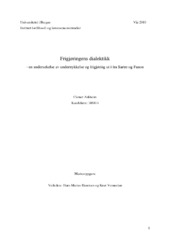| dc.description.abstract | Through a reading of Jean-Paul Sartres Critique of Dialectical Reason and Frantz Fanons The Wretched of the Earth I have tried to sketch out how we can understand and analyze oppression and liberation as concrete historical phenomenon. Related to this we find questions of spontaneity, mass movements, violence and organization. How do such processes originate in individuals and their actions and how do such actions alter the structural organization of the surroundings at the same as it alters the individuals who act? What does it take to conquer oppression and how are groups constituted on the basis of liberation struggles? The ultimate question will be what types of rationality or thinking makes it possible to grasp and articulate experiences of oppression and liberation struggles? These theoretical discussions will be centered around the topic of colonialism and post-colonialism, which is the concrete starting point for Fanon, but which also Sartre discusses and refers to explicitly. To limit the investigation I have mostly kept to the African continent and the colonial struggles that took place there. The investigation begins with an overview of the concrete historical context that Sartre and Fanon wrote in. This is because their texts is too a large extent intertwined with the wider context. The first chapter is a presentation of the structure and movement in Sartre's Critique. The second chapter takes us through the same procedure with Fanon and The Wretched of the Earth, and the third chapter is a comparison between the two. In the fourth and last chapter I discuss some of the fundamental critique that have been raised towards Sartre and Fanon's approach, and relates their thinking to a wider context. The investigation taken as a whole tries to remain faithful to the totalising way of thinking that Sartre and Fanon proposes and it is therefore not so concerned with long discussions about particular interpretations or terms. | en_US |
| dc.description.abstract | De overordnende spørsmål jeg har undersøkt er hvordan vi ut i fra Sartres Kritikk av den dialektiske fornuft og Fanons Jordens fordømte kan forstå og analysere undertrykkelse og frigjøring som konkrete historiske fenomener. Ut i fra dette følger problemer relatert til vold, spontanitet, massebevegelser, organisering og mobilisering. Hvordan kan slike prosesser skapes med utgangspunkt i enkeltmenneskets virksomhet, og hvordan påvirker og påvirkes tunge strukturelle forhold av denne virksomheten? Hva skal til for å overvinne undertrykkelse? Hvordan konstitueres fellesskap på bakgrunn av en felles opplevelse av en felles situasjon? Og det overordnede spørsmål, hvilke tankeformer gjør det mulig å gripe og artikulere erfaringer av undertrykkelse og frigjøringskamp? I og med at Fanon finner sitt utgangspunkt i den koloniale problematikken og Sartre behandler den utførlig, både teoretisk og politisk, var det nærliggende å legge den foreliggende fremstillingen tett inn på kolonialismen og avkoloniseringen. Avhandlingen begynner med et kapittel der jeg forsøker å skissere den bestemte historiske konteksten som Sartre og Fanon skrev sine verker i. Deretter følger en fremstilling av Sartres Kritikk. Det ligger i dialektikken som en totaliserende og innvendig tenkemåte at de ulike elementene henger sammen innen totaliseringen og dersom jeg skulle utelatt enkelte elementer eller momenter, kunne jeg risikere at oppbyggingen ikke lenger hang sammen. Tredje del er en gjennomgang av Jordens fordømte, men hvor teksten ligger tettere på kolonialismen og post-kolonialismen som konkrete historiske felt. Fjerde del fører Sartre og Fanon sammen, men fokusert rundt forskjeller og likheter i forhold til klassekamp og kolonialisme, en klargjørende analyse av Fanon og Sartres ulike voldsbegreper, en diskusjon av det tvetydige ved begrepene nasjonalisme og humanisme, og et blikk på Sartres institusjonalisering i forhold til Fanon og statsdannelsene i de frigjorte koloniene. I siste kapittel ser jeg på enkelte innvendinger som kan rettes og har blitt rettet, mot noen av de grunnleggende forutsetningene for den tenkemåten Sartre og Fanon representerer. Her kommer blant annet Claude Lévi-Strauss, Louis Althusser og Jean Baudrillard til orde og fokuset er rettet mot Sartre, i og med at det er i Kritikken de konstituerende forutsetningene for dialektikken legges ut. De ulike innvendigene kommenteres etterhvert og jeg har latt disse bemerkningene avslutte undersøkelsen, fremfor en mer tradisjonell konklusjon. | en_US |
